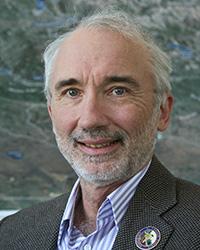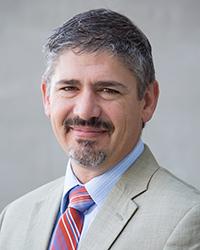Professors’ Expertise Tapped for Policy Discussions at Drought Summit
Two researchers from University of California, Merced, are slated to take part in the UC Drought Science, Policy and Management Summit at the state Capitol next week.
 Professors Roger Bales and Joshua Viers, the director of the campus’s Center for Information Technology Research in the Interest of Society (CITRIS), will take part in panel discussions during the daylong summit organized by UC Davis at the request of UC President Janet Napolitano.
Professors Roger Bales and Joshua Viers, the director of the campus’s Center for Information Technology Research in the Interest of Society (CITRIS), will take part in panel discussions during the daylong summit organized by UC Davis at the request of UC President Janet Napolitano.
The April 25 summit at the state Capitol is free and open to the public, though registration is required.
It’s another example of the contribution UC Merced makes to the state, nation and world, and the role it can and does play in informing policy makers and the public on timely and important issues.
“Nothing is more vital to the health and prosperity of California than a safe and reliable water supply, as this third straight year of extreme dry conditions reminds us,” Napolitano and UC Davis Chancellor Linda P.B. Katehi wrote. “Given the UC’s unique role and public service responsibility, we called for a summit of faculty from across our campuses and others to explore the best ways to mitigate effects of the current drought and prepare for future water shortages.”
The UC has a long history of game-changing research, and has many expert researchers who work at every level of water management and policy, bringing insights from multiple disciplines, including engineering, economics, ecosystem management, water conservation, farming, forestry and public health.
The panel experts were chosen to showcase the best the UC has to offer when it comes to water and drought research. UC Merced, the Sierra Nevada Research Institute and CITRIS are making critical contributions to the larger effort throughout the state, from Bales’s hydrology research and advocacy for a unified statewide water-information system, to Viers’s work in hydroinformatics.
 Viers’s emerging field of study focuses on the intersection of science and policy as it relates to improving the underlying information about water – its collection, storage, synthesis and dissemination.
Viers’s emerging field of study focuses on the intersection of science and policy as it relates to improving the underlying information about water – its collection, storage, synthesis and dissemination.
“At present, we have primitive technologies and tools to account for surface and ground water supply, storage, distribution and end use. Further, we have antiquated and inflexible means of rationing this limited resource in times of crisis, such as now,” Viers said.
Because the primary audience at the summit will be legislative staff members, Viers said he hopes they come away knowing more about the drought than they did.
“We will provide timely and insightful answers to their questions,” he said.
“Compared to the rest of the world California has a relatively high level of water security, owing in part by our water storage and conveyance systems,” Bales said, “and we need to update our water management to meet the challenges posed by an increasing population and by climate change.
“We and other UC researchers are bringing new knowledge on the links between water and forest management, new low-cost technology for accurate water measurements, and many other advances to bear on water decision-making,” he added.
Bales is part of the panel on “challenges and opportunities in coping with the drought: agriculture, cities, government and the environment,” while Viers lends his expertise to the panel on “economic consequences of the drought: agriculture, energy, forests, industry and water.”
Other panelists for the summit include experts from the UC Division of Agriculture and Natural Resources, the Office of the President, the Irvine, Santa Cruz, San Diego, Davis, Berkeley, LA and Riverside campuses, Stanford University, Cal Poly and others.
